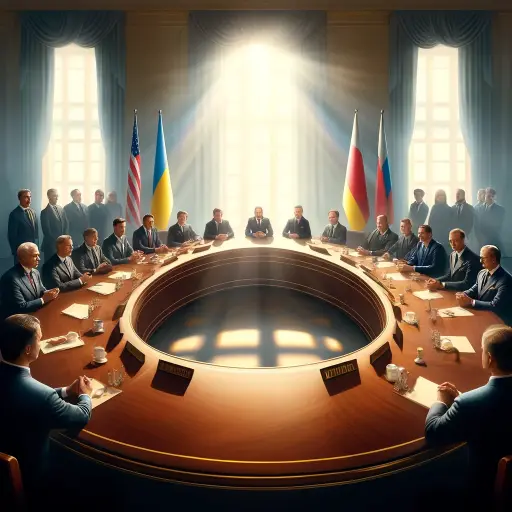A recent report by Reuters, quoting the Russian state-controlled Tass news agency, stated that Belarusian President Alexander Lukashenko commented on the potential for initiating peace talks between Russia and Ukraine. Lukashenko suggested that the current circumstances were favorable for beginning such discussions. He highlighted that preliminary documents, which were initially discussed by Russian and Ukrainian representatives during the early stages of the conflict in meetings held in Turkey, could be utilized as foundational texts for these negotiations. According to Lukashenko, these early discussions have laid a groundwork that could potentially lead to more formal peace talks, aiming to find a resolution to the ongoing conflict.
But the war still shows no sign of letting up as Russia continues to attack Ukraine.
A Russian missile attack on an educational institution in a popular seafront park in the Ukrainian Black Sea port of Odesa, known locally as ‘Harry Potter castle’, on Monday killed at least five people and injured 32, local officials said. The building is reportedly the residence of prominent former MP Serhiy Kivalov, who was among those said to have been injured in the strike.
NATO Secretary General Jens Stoltenberg stated in Kyiv that delays in NATO countries fulfilling their commitments to Ukraine have favored Russian advances on the front lines.
“These significant delays in support have had serious consequences on the battlefield,” said Stoltenberg during a meeting with Ukrainian President Volodymyr Zelenskiy.
According to Ukrainian officials, Russia is preparing for a major offensive this summer, although currently, its progress is minimal. Stoltenberg also noted, “The shortage of ammunition has enabled Russian forces to advance at the front, a lack of air defense has resulted in more Russian missiles reaching their targets, and the absence of deep strike capabilities has allowed Russian forces to mass more effectively.”
Zelenskiy acknowledged that new supplies from the West have begun to arrive, albeit slowly, and emphasized the need to accelerate this process.
Also, U.S. President Joe Biden recently signed into law a bill that rushes $95bn in foreign aid to Ukraine, Israel and Taiwan, a bipartisan legislative victory he hailed as a “good day for world peace” after months of congressional gridlock threatened Washington’s support for Kyiv in its fight to repel Russia’s invasion.
UN sanctions monitors have informed a Security Council committee that debris from a North Korean Hwasong-11 ballistic missile, likely illegally supplied to Russia, was found in Kharkiv after a strike on January 2, according to a report seen by Reuters.
North Korea has been under UN sanctions since 2006 due to its nuclear and ballistic missile programs and is accused of providing weapons to Russia in violation of an arms embargo. The US has accused Russia of using North Korean-supplied ballistic missiles in at least nine attacks against Ukraine.
Meanwhile, Polish farmers have ended a two-month blockade of border crossings with Ukraine, which was prompted by concerns over agricultural imports and perceived unfair competition, officials announced on Monday.
French president Emmanuel Macron on Thursday warned that Europe faced an existential threat from Russian aggression, calling on the continent to adopt a “credible” defense strategy less dependent on the US, reports Agence France-Presse.
He described Russia’s behavior after its invasion of Ukraine as “uninhibited” and said it was no longer clear where Moscow’s “limits” lay.
Macron also sounded the alarm on what he described as disrespect of global trade rules by both the US and China, calling on the European Union to revise its trade policy.
“The risk is that Europe will experience a decline and we are already starting to see this despite all our efforts,” he warned, saying the continent was in a situation of “encirclement” from other regional powers.
“We are still too slow and not ambitious enough,” he added, urging a “powerful Europe,” which “is respected,” “ensures its security” and regains “its strategic autonomy.”
According to AFP, Macron urged Europe to be more a master of its own destiny, saying in the past it was over-dependent on Moscow for energy and Washington for security.
He said the indispensable “sine qua non” for European security was “that Russia does not win the war of aggression in Ukraine.”
“We need to build this strategic concept of a credible European defence for ourselves,” Macron said, adding Europe could not be “a vassal” of the US.
It is good that Macron recognizes this need to become independently capable of defending Europe. Hopefully, Russia will back down and refrain from taking this war even further.
At times, Russian officials have indicated a willingness to engage in negotiations, but these gestures have often come with preconditions or have been met with skepticism by Ukraine and its allies due to ongoing military actions and strategic objectives that suggest a readiness to continue the conflict.
Ukraine and its international partners have generally insisted that any peace talks must include the restoration of Ukraine’s territorial integrity and the withdrawal of Russian forces. The dynamics of the conflict, ongoing military engagements, and international responses continue to heavily influence the feasibility and nature of any potential negotiations.
